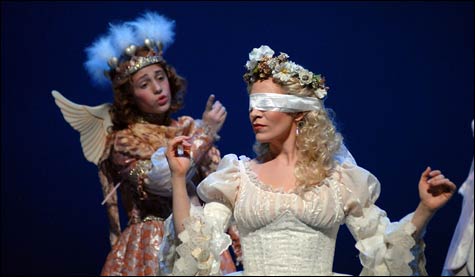
PSYCHÉ: Carolyn Sampson eschewed the textbook posing that has plagued previous BEMF
productions. |
Mascagni’s Cavalleria Rusticana and Leoncavallo’s Pagliacci — the traditional double bill of “verismo” masterpieces, late-19th-century operatic breakthroughs into an earthy, anti-heroic “realism” that focus on dramatic confrontation and feverish theatricality, their plots boiling over with betrayals, revenge, and murder — might not seem an ideal vehicle for concert opera. Yet these chestnuts have not been roasted around these parts in years, and the semi-staged performance Jeffrey Rink led with Chorus pro Musica, a stellar orchestra, and a fine cast of (mostly) Boston newcomers proved that even without scenery or traditional costumes, these operas can pack a wallop. In concert, the vivid and colorful orchestration is front and center, and both operas are wonderful vehicles for chorus.
Both Cav and Pag also have elements that are not strictly realistic. Based on a short story by the great Sicilian writer Giovanni Verga, Cavalleria rusticana — “rustic chivalry” (the title has more than a dash of irony) — is a tight little melodrama in which all the violent passions erupt on Easter Sunday. (The Easter hymn is Mascagni’s most famous chorus.) It’s almost a direct inversion of a heroic opera like Verdi’s Ernani. Both works are driven by a rigid code of honor that leads to the hero’s doom, but in Mascagni, the characters are poor, uneducated Sicilian villagers, not Victor Hugo aristocrats. And though the plot is less elaborate, it’s equally and perhaps even more elegantly contrived.
Pagliacci, “Clowns” (there’s no article in Leoncavallo’s title — we’re all clowns — though CpR perpetuates the common error of calling it I pagliacci), is more complex. A troupe of commedia dell’arte actors are putting on a play that mirrors with disastrous results their “real life” situation. In his Prologue, Leoncavallo underlines the inextricable interweaving of the theatrical and the actual. These two operas began sharing a double bill as early as 1893, a year after the premiere of Pagliacci and three after that of Cavalleria.
All the performers threw themselves into their parts, vocal soloists and chorus alike singing from memory. Rink’s conducting swept one along on torrents of climaxes. He shaped Mascagni’s soaring tunes eloquently and seemed to delight in the elegance of Leoncavallo’s orchestra, with its evocative music for flute (Julia Skolnik) and harp (Martha Moor capturing both folk-like and celestial aspects). The chorus sang with conviction, as both devout and carousing villagers and as the audience for Leoncavallo’s touring players, not only singing but also applauding the “actors” and gasping at the murder. The NEC Children’s Chorus was remarkably professional.
Verismo operas need big voices, and Rink cast these operas with several outstanding ones. The suavest and most lyrically refined belonged to a young Harvard grad, baritone Joshua Benaim, as Silvio in Pagliacci, the lover of Nedda, the company comedienne who plays Columbine. In Cavalleria, Greek-American soprano Layna Chianakas was a firm-voiced and impassioned Santuzza, the betrayed heroine. Her gestures tended to be heavy-handed (slapping her hands against her stomach whenever she sang of being excommunicated); she conveyed Santuzza’s anger more than her desperation. Chianakas has played leading roles in many regional productions as well as in Europe, but I suspect she hasn’t had enough contact with first-rate stage directors; better stage guidance could catapult her career. (She should also shed her uncollegial habit of ending a high note just after everyone else has stopped singing.) As Alfio, the betrayed husband in Cavalleria, baritone David Murray, who’s familiar to Boston audiences, gave yet another vivid characterization.